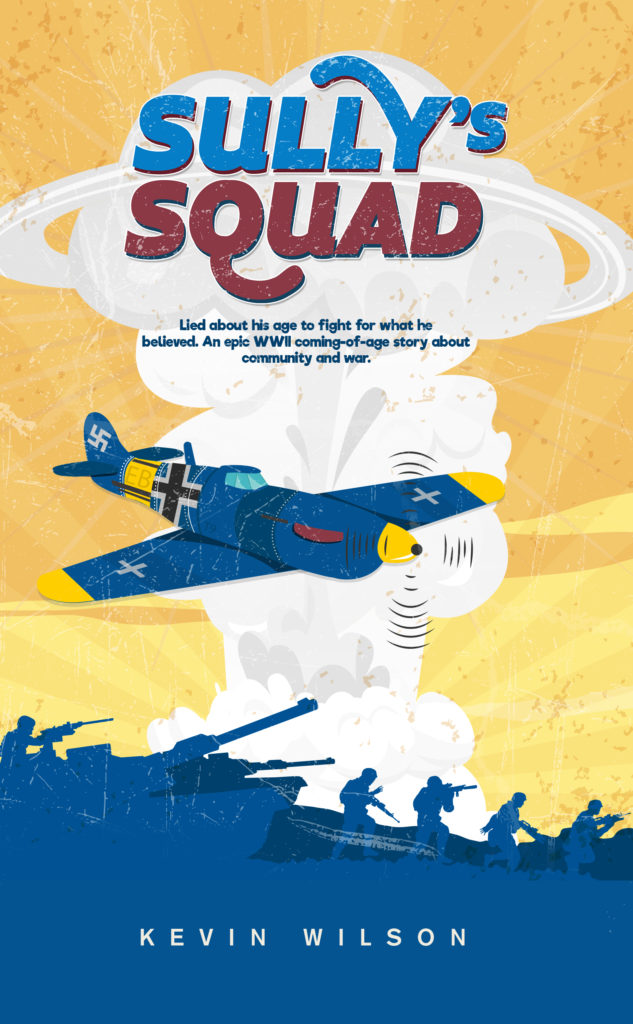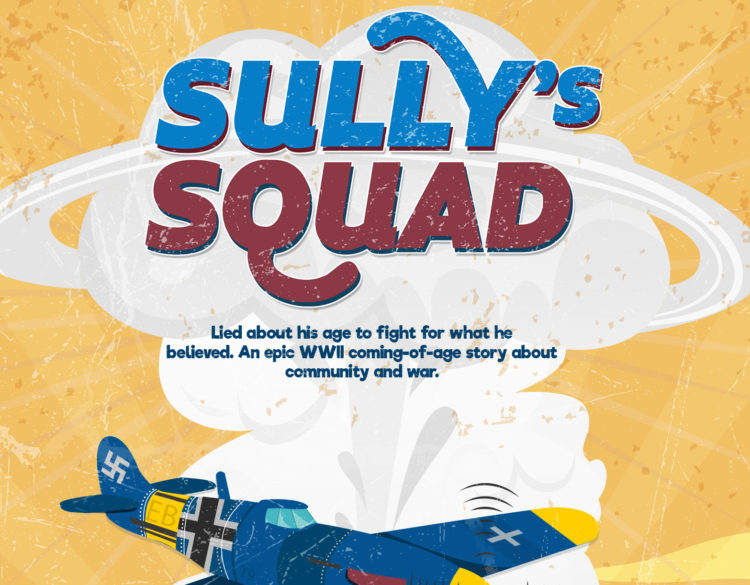Editor’s note: Enjoy this excerpt from SOFREP author Kevin Wilson’s book, Sully’s Squad. The book will be published on May 25, 2020. The main characters of Sully’s Squad are rooted locally to upstate New York and the novel is partially based and dedicated to a local war hero. Sully’s Squad is not only a WWII epic, but also a moving coming-of-age tale, told through the eyes of a fifteen-year-old Arty, who lies about his age to enlist. The story is poignant and sensitive in terms of describing battlefield deaths, shellshock and the emotions that surround them along with the impact on those families back home.
I’d been prepared to enlist—since December 7, 1941, to be exact. Dad and I had just returned home with a six-foot evergreen whose fragrance filled the home, competing with the sweet smell of my mom’s sugar cookies. I stuck a pine needle between my lower front teeth; it was sharp and pleasantly spicy. Dad set the stand in the far corner of our living room and I held the tree upright while he tightened the screws against the trunk.
My parents’ favorite Sunday afternoon show, “Sammy Kaye’s Sunday Serenade,” played on the dining room radio while Suzanne, Catherine, Dad and I began trimming the tree. Mom was busy baking in the kitchen. I stepped outside onto the back porch to gather a few extra logs for the woodstove. A stronger wind had replaced the brisk morning air and dark blue clouds covered the sun. It felt like snow. I shivered with cold and excitement. Maybe tomorrow would be a snow day!
Back inside, Dad checked on the wood stove and returned to the tree. “Arthur can you grab…” He stopped mid-sentence and focused on the radio.
“We interrupt this program to give you a special news bulletin,” a journalist announced. Mom joined us in the living room as he continued. “The Japanese have attacked Pearl Harbor in Hawaii by air… thee attack was also made on all naval and military activities in the principal Hawaiian island of Oahu… A Japanese attack on Pearl Harbor would naturally mean war. Such an
attack would naturally bring a counter-attack and hostilities of this kind would mean that the President would ask Congress for a Declaration of War… We return you now to your regularly scheduled program and will give you more information as it comes along from the White House.”
Dad turned off the radio, pulled out his pipe and slammed the back door on his way out. The words “declaration of war” lingered in the air. I felt as if I stood in cement. It was as if time had suspended itself and we were all statues. Mom sat down on the couch and began to pray quietly. The next day in school we listened to President Roosevelt declare war on Japan. A feeling of anger came over me as he described the attack; so many lives were lost. I could feel my body become stiff as I clenched my hands and jaw. By the end of the week, Germany also declared war on the United States.
In the days to come, all everyone talked about was the attack. Dinner conversations centered around who enlisted. My friends and I talked less about sports and more about strategies for enlisting early. For a while, our daily basketball games were replaced with watching activity around the military recruitment offices on South Broadway. We were just shy of sixteen. This was going to present a problem. Then my friend, Billy, learned about a guy forging free fake ID’s for anyone who wanted to enlist before the age of 18. The following Saturday afternoon a bunch of us went to the pool hall and picked up our fake IDs. None of us, though, had the courage to actually join up. Six months later, I would be the first.
A flag hangs by the door of the recruitment office, waving slowly in the morning breeze, just like the flag that hung off our porch at home. My father worshipped the flag. He knew all the rules around flag maintenance, but I never paid much attention when he rattled them off. More than once I’d wondered why he went to so much trouble for a piece of cloth. But I didn’t feel that way now.
My father was a veteran of the Great War. After Hitler’s army invaded Eastern Europe, he had told anyone who would listen that he was ready to join the fight, if they’d just take him. “If I was young today,” he often said, “I would enlist.” He talked about the army as a good career, one I should consider after high school. Since money was always a challenge for my family, college wasn’t an option. And after yesterday’s game, a baseball scholarship seemed unlikely.
Almost 16, I knew I’d be among the youngest to enlist. But something deep inside told me it was now my turn to serve. On the door of the office was a poster of Uncle Sam, beckoning me in with his bony right finger. Inside, the office was crowded with guys older, bigger and stronger than me.
“Come in, son,” said a man in a uniform. He smiled, but he had a handshake grip that brought me to my knees. “How can I help you?”
Already have an account? Sign In
Two ways to continue to read this article.
Subscribe
$1.99
every 4 weeks
- Unlimited access to all articles
- Support independent journalism
- Ad-free reading experience
Subscribe Now
Recurring Monthly. Cancel Anytime.
“I’m here to enlist,” I replied nervously.
“Have a seat.”
As I took a seat on a metal chair, I noticed his badge said Captain Douglas.
“So why are you here?” Captain Douglas asked.
“Uh, sir, um, I want to enlist in the infantry.”
I thought he might ask me why, but he just smiled. “I was also in the infantry,” he said. “In today’s army, there are lots of opportunities for a young man. Here’s a form. Fill it out and come back when you’re done.”
A few minutes later, I returned the form. He examined my fake ID, flipped the card and looked at me. I coughed, my heart skipping a beat. “Looks in order,” he said with a nod. He pointed to a hallway. “Time for a physical. The changing area is ahead. Strip down to your undies. Come back when you’re done.”
I was pleased to see no one else was there when I got to the changing room. As I changed, I stared back at posters of soldiers with rifles and bayonets pointed in the air that proclaimed, “Victory in Europe is because of you, the volunteer.”
The doctor knocked, but he didn’t wait for my answer before he pushed the door open. He was an older man with a stethoscope hanging from his left pocket. A strong cigarette smell wafted from his wrinkly skin and his bifocals glistened against the overhead lamp.
After a muttered “hello,” he immediately took my blood pressure, his right hand trembling. Then he turned and coughed loudly towards the wall before returning to examine my ears and nose. If I was a barber, I observed, I could make a living just on his nose and ear hair. I gagged as he pushed a wooden stick onto my tongue. Then he examined my feet. “Ah, no flat feet here. You’ve got a good arch.” He finished with an eye test, which I passed.
As I walked out, Captain Douglas waved. “Arthur, over here.”
My mind began to race. Did he find out I was not of age? Was he going to bring me to the Sheriff ’s office to be picked up by my parents?
“Here’s your ID. Welcome to the Army. Watch for a telegram for your bus trip to Fort Benning. I look forward to seeing you at the station in Saratoga.”
Then he squeezed my hand again with his powerful grip.
Pre-order or purchase your e-book copy of Sully’s Squad through Amazon and Apple today!












COMMENTS